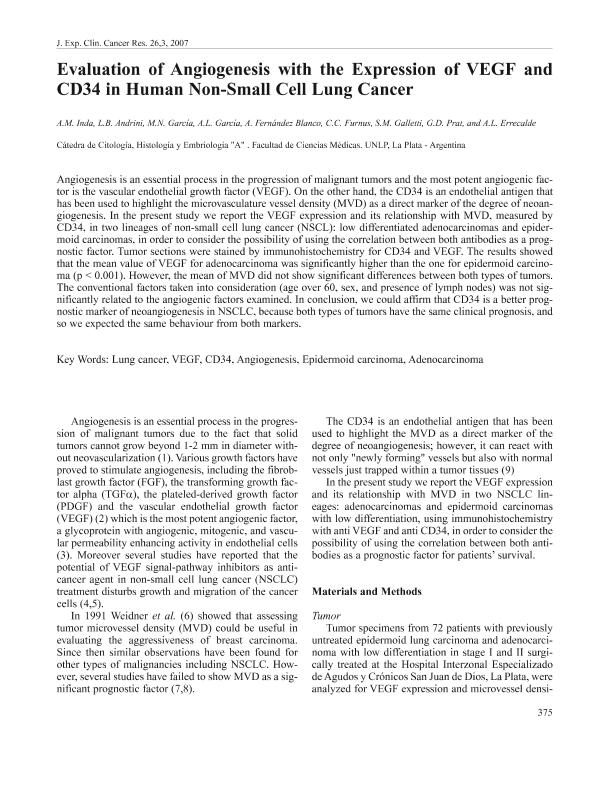Artículo
Evaluation of angiogenesis with the expression of VEGF and CD34 in human non-small cell lung cancer
Inda, Ana María; Andrini, L.; García, Marcela Nilda; García, Adriana Laura; Fernandez Blanco, Ayelen; Furnus, Cecilia Cristina ; Galletti, S.M.; Prat, G.D.; Errecalde, Ana Lia
; Galletti, S.M.; Prat, G.D.; Errecalde, Ana Lia
 ; Galletti, S.M.; Prat, G.D.; Errecalde, Ana Lia
; Galletti, S.M.; Prat, G.D.; Errecalde, Ana Lia
Fecha de publicación:
09/2007
Editorial:
American Association for Cancer Research
Revista:
Journal of Experimental & Clinical Cancer Research
ISSN:
0392-9078
Idioma:
Inglés
Tipo de recurso:
Artículo publicado
Clasificación temática:
Resumen
Angiogenesis is an essential process in the progression of malignant tumors and the most potent angiogenic factor is the vascular endothelial growth factor (VEGF). On the other hand, the CD34 is an endothelial antigen that has been used to highlight the microvasculature vessel density (MVD) as a direct marker of the degree of neoangiogenesis. In the present study we report the VEGF expression and its relationship with MVD, measured by CD34, in two lineages of non-small cell lung cancer (NSCL): low differentiated adenocarcinomas and epidermoid carcinomas, in order to consider the possibility of using the correlation between both antibodies as a prognostic factor. Tumor sections were stained by immunohistochemistry for CD34 and VEGF. The results showed that the mean value of VEGF for adenocarcinoma was significantly higher than the one for epidermoid carcinoma (p < 0.001). However, the mean of MVD did not show significant differences between both types of tumors. The conventional factors taken into consideration (age over 60, sex, and presence of lymph nodes) was not significantly related to the angiogenic factors examined. In conclusion, we could affirm that CD34 is a better prognostic marker of neoangiogenesis in NSCLC, because both types of tumors have the same clinical prognosis, and so we expected the same behaviour from both markers.
Palabras clave:
Lung Cancer
,
Vegf
,
Cd34
,
Angiogenesis
,
Epidermoid Carcinoma
,
Adenocarcinoma
Archivos asociados
Licencia
Identificadores
Colecciones
Articulos(IGEVET)
Articulos de INST.DE GENETICA VET ING FERNANDO NOEL DULOUT
Articulos de INST.DE GENETICA VET ING FERNANDO NOEL DULOUT
Citación
Inda, Ana María; Andrini, L.; García, Marcela Nilda; García, Adriana Laura; Fernandez Blanco, Ayelen; et al.; Evaluation of angiogenesis with the expression of VEGF and CD34 in human non-small cell lung cancer; American Association for Cancer Research; Journal of Experimental & Clinical Cancer Research; 26; 3; 9-2007; 375-378
Compartir



